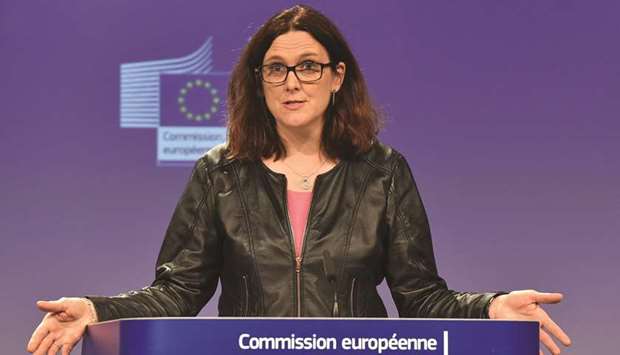On the same day it filed a WTO complaint over US metal tariffs, the EU turned to the global trade arbiter to challenge Chinese intellectual-property legislation that forces European companies going to China to grant ownership or usage rights to local entities.
China already faces the threat of US duties on as much as $150bn of Chinese goods sold in the American market as a result of alleged IP theft.
“We are challenging today both the US and China at the WTO and it demonstrates that we are not choosing any sides,” EU Trade Commissioner Cecilia Malmstrom told reporters on Friday in Brussels. “We stand for the multilateral system, for rules-based global trade.”
The EU complaints against China and the US highlight political cross currents that are buffeting the global trade order and shaking up traditional alliances.
The case against Washington over metal-import levies that President Donald Trump has justified on national-security grounds puts Europe in the camp of China, which complained to the WTO right after the US imposed the measures on March 23.
The EU followed suit after losing an exemption and, in a separate move, intends to hit US goods with a retaliatory tariff as soon as June 20.
“It is pure protectionism,” Malmstrom said. “European steel and aluminium exports to the US cannot be seen as threat to their internal security.”
The technology-transfer case against Beijing runs parallel to the Trump administration’s use of part of a 1974 US trade law – section 301 – to press China to address IP-related concerns such as trade-secret theft, online piracy and forced technology transfer.
It is in that context that the US has started a WTO case against China and been threatening duties on a range of Chinese goods.
Beijing has responded with a WTO complaint of its own.
While the EU has loudly criticised Trump’s “America First” agenda and his protectionist tilt, the 28-nation bloc has expressed support in Geneva for US calls for stronger IP protection in China.
“Technological innovation and know-how is the bedrock of our knowledge-based economy,” Malmstrom said. “It’s what keeps our companies competitive in the global market. We cannot let any country force our companies to surrender this hard-earned knowledge at its border.”
In its complaint, the EU is targeting rules in China on the import and export of technologies and on Chinese-foreign equity joint ventures.
Certain provisions “discriminate against non-Chinese companies and treat them worse than domestic ones,” violating WTO requirements that foreign businesses be put on an equal footing and that IP such as patents be protected, according to the European Commission, the EU’s executive arm.
EU-China relations have also been strained in recent years by Chinese steel overcapacity, low-priced exports of numerous goods that undercut rival manufacturers in their home markets, domestic barriers to foreign investment and aggressive overseas acquisitions – all issues of concern to the US as well.
In a further sign of shifting alliances, the Trump administration’s decisions to pull out of a landmark global agreement to fight climate change and to abandon an international accord aimed at preventing Iran from developing nuclear weapons have pushed Europe and China closer together.
Malmstrom’s harshest comments on Friday were directed at the Trump administration, whose metal levies she said are creating the risk of “severe turbulence in the markets,” putting economic growth in jeopardy and “further weakening” trans-Atlantic relations.
“The US is playing a dangerous game,” Malmstrom said.

